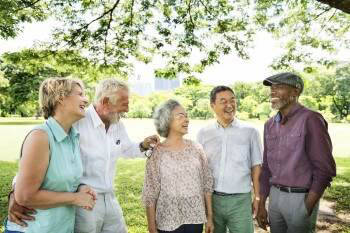- Home
- How to make the most of your retirement
How to make the most of your retirement
Retirement can be an incredible time in our lives, allowing us to enjoy and explore more of what life has to offer now that we are no longer working.
There is an abundance of options available to those in retirement; no matter where your interests or goals lie, you can stay busy and enjoy life to the fullest. In this guide, we will highlight just how you can make the most of your retirement – no matter if you are already retired and looking to see what’s possible, or if you are planning ahead for the future in a retirement village in Eastleigh.
We spoke to Martin, the CEO of Silversurfers – an over 50s lifestyle and news website – who highlighted when speaking to us the many options available to those in retirement:
“Until recent years, people worked in one job and tended to retire in their 60s. Life is not so simple now with many people retiring from their main job but also finding they need to work part-time to supplement their income. It is important to keep active in retirement and to find new hobbies and interests. We know our Silversurfers members are very active with many still working and also enjoying having some more time to themselves. We often see the comment ‘I do not know how I had the time to work!’
"The internet ensures that people remain connected to their friends and family and provides a social network which is important for everyone. Retirement also enables people to pursue hobbies and to travel more. With the internet enabling everyone to be their own travel agent, it is simple to find cheap flights and accommodation especially out of the main holiday peaks. Most of us will be lucky having at least 20 years of retirement to enjoy so it can be a very fulfilling time of our lives."
Relish this new stage of life
 Retirement is a time delve into new opportunities that we may not have had the time to devote to in the past. To fully make the most of one’s retirement, it will be greatly beneficial to relish this new stage of life and appreciate all that it can offer. There’s still so much time to achieve your goals and explore new challenges. Retirement is a new chapter, it’s a wonderful opportunity to enjoy more of life now that you have extra time on your hands.
Retirement is a time delve into new opportunities that we may not have had the time to devote to in the past. To fully make the most of one’s retirement, it will be greatly beneficial to relish this new stage of life and appreciate all that it can offer. There’s still so much time to achieve your goals and explore new challenges. Retirement is a new chapter, it’s a wonderful opportunity to enjoy more of life now that you have extra time on your hands.
Kathy Lawrence, the editor of When They Get Older, a site full of advice to support ageing family and friends, spoke to us about embracing the opportunities available in retirement: “The shock of working full-time one day and being completely retired the next is, thankfully, mostly a thing of the past. People retire gradually, perhaps cutting their hours, or changing to a different part-time job in later life. It’s a great time to start ticking off all those things you’ve always meant to do – places to visit, new skills to learn, people to visit. Even on a very tight budget, it’s surprising what you can do.”
Importantly, figure out what you want from your retirement, set goals, and make a plan. If you are unsure about how to do this, speak to friends, family, or you could even talk to a qualified life coach who can help you figure out this exciting next stage of life.
Seek purpose and meaning
A great way to discover what it is that you want from retirement, and to spend your time doing, is by first finding your purpose. Your goal can simply be to relax, socialise and enjoy the fruits of a successful life but if you are looking for something a little more focused, why not ask yourself what it is that you care about? What are the things that make you happy? Once you have realised this, your retirement can take on an incredible focus and direction. All of a sudden, you will know what you want to dedicate your time to. Whether that’s participating in a worthwhile cause or simply following a passion you’ve long overlooked. Think about what will make retirement meaningful for you – the benefits will be truly wonderful.
 As mentioned, a life coach can certainly help in this regard and the Life Coach Directory would be a great place to look, being a comprehensive database of UK life coaches. Life Coach Directory member Nick Harris offers his advice for a successful retirement, including focusing on what he calls ‘life planning’ to help find meaning and purpose:
As mentioned, a life coach can certainly help in this regard and the Life Coach Directory would be a great place to look, being a comprehensive database of UK life coaches. Life Coach Directory member Nick Harris offers his advice for a successful retirement, including focusing on what he calls ‘life planning’ to help find meaning and purpose:
“The dictionary definitions of ‘retire’ are withdraw, retreat, recede, go into seclusion. Healthy retirement is about none of those things - it’s about discovery, expansion, connection and reinvention.
“Conventional retirement planning focuses on finance rather than on the wider aspects of retirement such as health and activities. Whilst sufficient income is important, equally important is life planning.”
Nick notes a few key areas to focus on when life planning:
- “Social network: the quality of relationships is fundamental to determining life satisfaction after retirement. This means looking to cultivate relationships beyond your immediate family and work network
- “Purpose and mental challenge: creating outlets for talents whether via work or volunteering

- “Personal development: learning new skills, physical activity, pursuing new interests
- “Fun: doing more of what you find motivating and enjoy, this brings satisfaction and meaning
“All of this requires a measure of selfishness and planning to avoid becoming isolated or overwhelmed by the demands of family and others. A life coach can help you to create a plan and address the personal aspects of moving from the current phase of your life to the next, exploring questions such as ‘What do I want out of life?’, ‘What do I enjoy?’ ‘What new opportunities will I create?’ ‘What new relationships will I cultivate?’
“Retirement is an exciting new phase which can seem daunting when the past focus has primarily been raising a family and building a career. A life coach can help you to sort through the complex emotional choices which you will face as you build a new sense of identity, purpose and meaning.”
Be prepared
Transitioning into retirement is a significant moment in a person’s life and some people will certainly benefit from making this change slowly and with care. Being prepared for retirement is important and this is the advice that the team at Gransnet – a social networking site for over 50s – recommend:
 “Retirement is something that is discussed often on the Gransnet forums. There are many things that our users value about not working any more, from not being a slave to the alarm clock to enjoying the freedom of being able to do what you want whenever you want. Obviously, not everyone will share the same ideas about how to make the most of this time.
“Retirement is something that is discussed often on the Gransnet forums. There are many things that our users value about not working any more, from not being a slave to the alarm clock to enjoying the freedom of being able to do what you want whenever you want. Obviously, not everyone will share the same ideas about how to make the most of this time.
“It's a huge lifestyle change, and for some, it can take a bit of getting used to. So, it's a good idea to do a bit of forward planning and really have a think about how to make having all this extra time a positive. While many relish the freedom to throw off old routines, others find the lack of structure in a non-working day more of a challenge, so it's a good idea to have the first few weeks planned out if you think this might be an issue for you.”
The act of being prepared for retirement is also something that Denise of Amazing People recommends. Denise is a career and life coach, and also the chief inspiration officer at The 50Plus Coach. She says that retirement shouldn’t be seen as an end but a new beginning. Denise spoke to us about how important it is to start thinking about retirement early:
“Start thinking now, and think about your wider life – you will have an extra 2,000 hours a year, how do you want to spend them? Do you want to start a new hobby, go back to work, to do a job you love, focus on volunteering or devote time to a sport or hobby? Get thinking of all the things that you would like to do. Also, think about where you want to live. Do you want to downsize or right size? Maybe a move from the country to a town or city.”
Be on top of your finances
The last thing those entering retirement want to be concerned about is personal finances. This period of life can bring so much joy and fulfilment, those moving into retirement apartments near Eastleigh or elsewhere have so many delights to spend their energy on that it is a shame when money gets in the way. So, with this in mind, if you are preparing for your future, it’s a very smart idea to be on top of your finances, and it’s doubly true when concerning retirement.
 The team at Gransnet spoke to us about the importance of getting one’s finances in order when it comes to being prepared for retirement: “While it's lovely to be able to enjoy new-found freedom with a bit of spontaneity, it's definitely useful to plan ahead to some extent. Financial and budget planning is especially helpful at a time when there is usually a dramatic change in income. Worrying about money can take the sheen off even the most anticipated activities, and it's always better to know exactly where you are on this front.”
The team at Gransnet spoke to us about the importance of getting one’s finances in order when it comes to being prepared for retirement: “While it's lovely to be able to enjoy new-found freedom with a bit of spontaneity, it's definitely useful to plan ahead to some extent. Financial and budget planning is especially helpful at a time when there is usually a dramatic change in income. Worrying about money can take the sheen off even the most anticipated activities, and it's always better to know exactly where you are on this front.”
Make sure to organise your finances so that you can figure out what you are working with and will have to live on. Get your pension information in order (you might have more than one) and check what benefits are available to you. Living a frugal life in the build-up to retirement can also help, preparing you for the finite resources that will be utilised in the future. You could even consider speaking to a financial advisor or retirement planner like We Are Just (a leading provider of retirement and financial solutions whose goal is to help you secure a fulfilling retirement).
 Stephen Lowe, the group communications director for Just Group (We Are Just), spoke to us about his advice for financially planning for retirement: “Planning for retirement requires thinking about how much money you are going to need to live on and how long it might need to last. We all have an idea of what we would like our retirement to be like so we need to consider how much it might cost and where that money is going to come from.
Stephen Lowe, the group communications director for Just Group (We Are Just), spoke to us about his advice for financially planning for retirement: “Planning for retirement requires thinking about how much money you are going to need to live on and how long it might need to last. We all have an idea of what we would like our retirement to be like so we need to consider how much it might cost and where that money is going to come from.
“My top piece of advice is to take an interest in your pensions and be clear how much income they might generate in retirement. This will require getting a forecast of how much state pension you may receive, plus taking time to understand the statements provided by employer or personal pensions.
“Before taking any money out of a pension, book a free appointment with Pension Wise (part of the government’s Money And Pension Service), which offers impartial and independent guidance on the various income options, some of which are more complex or expensive than others. Professional, regulated financial advice can also be useful if you want a personal recommendation of the best solution, tailored for you.”
 Speaking further about pensions and the importance of planning, Stephen said: “Life has its ups (job promotions, new relationships, receiving an inheritance) and downs (redundancy, divorce, ill-health). Planning acts as a financial satnav so we know where we are headed, how far there is to go, and what action we need to keep on course.
Speaking further about pensions and the importance of planning, Stephen said: “Life has its ups (job promotions, new relationships, receiving an inheritance) and downs (redundancy, divorce, ill-health). Planning acts as a financial satnav so we know where we are headed, how far there is to go, and what action we need to keep on course.
“A plan can help you make sense of big financial decisions such as whether you can afford to retire early or should aim to work for longer, or if you could take some pension money early or will be better off leaving it to grow for longer in a tax efficient environment. Even state pension can be deferred if not needed in return for a higher income later.
“True ‘pension freedom’ is knowing that you have the regular income you need to meet your retirement costs for the rest of your life, allowing you to invest, spend or give away the rest as you like.”
 Nick Daws from Pounds and Sense, a money-saving blog from a 50-plus perspective, talked to us about the value of pensions and the importance they have when planning for retirement:
Nick Daws from Pounds and Sense, a money-saving blog from a 50-plus perspective, talked to us about the value of pensions and the importance they have when planning for retirement:
“Life expectancies are rising all the time, and you could easily spend 30 years or more in retirement. It is essential to plan in advance for this and ensure you will have enough money to finance everything you want (and need) in your golden years.
“Put as much money as you can into your pension. Pensions are amazing value investments, as the government tops up your payments through tax relief at your highest marginal rate. If you work for an employer, you should receive additional contributions from them as well. No other investment can match this.
“Also, don't forget about the state pension, as for most people this will provide a major portion of their income in retirement. Get a forecast using the government website at https://www.gov.uk/check-state-pension. If this shows you're not on track to receive a full state pension due to an incomplete National Insurance contribution record, see if you can pay a lump sum to make up for the missing year/years.”
Don’t leave this to the last minute, plan ahead now so that you can make the most of your retirement.
Be open to new opportunities
 Those in retirement have often found that saying ‘yes’ to new opportunities is the best way to make the most of this rewarding period. In the earlier years of life, when family and career responsibilities are often the driving force by each decision we make, it’s often the case that we have to say ‘no’ to various opportunities that come our way. Well, retirement is the time to start reversing this trend. By saying ‘yes’ more often, without being irresponsible, many new and exciting opportunities will open up to you, whether that is new friendships, adventures, or discovering passions you never knew you had. The time is truly now, and retirement is the perfect chance to start saying ‘yes’ a little more often.
Those in retirement have often found that saying ‘yes’ to new opportunities is the best way to make the most of this rewarding period. In the earlier years of life, when family and career responsibilities are often the driving force by each decision we make, it’s often the case that we have to say ‘no’ to various opportunities that come our way. Well, retirement is the time to start reversing this trend. By saying ‘yes’ more often, without being irresponsible, many new and exciting opportunities will open up to you, whether that is new friendships, adventures, or discovering passions you never knew you had. The time is truly now, and retirement is the perfect chance to start saying ‘yes’ a little more often.
There is an important caveat to be made, however. You shouldn’t feel pressured to do anything you don’t want to do or feel unable to manage. This is an excellent point made by Denise of Amazing People: “Think about the demands on your time. Just because you have free time it doesn’t mean you should say yes to everything, whether it be babysitting, volunteering or doing everything with your partner. Think about what you want to do and know that you can change your mind.”
Look after your health
Many of us go through life just hoping that health issues won’t present themselves – not wanting to worry about these possibilities in the present. Unfortunately, there is no avoiding your health and one way to ensure that you don’t make the most of your retirement is by ignoring your body. So instead, get a health check and stay on top of your health. Now is the time to consult your doctor so that they can screen for various health issues such as heart disease, strokes, diabetes, kidney disease, and dementia. If you have not been diagnosed with one of these, the NHS will invite those aged 40 – 74 for a check-up every five years. Take advantage of the free NHS Health Check now so that any preventive measures can be taken, allowing you to better enjoy the years ahead.
Keep physically active
 One way you can help to ensure good health in the years ahead is by keeping physically active. In older age, it is when we stop being active that we experience a diminution in health, so it’s important now that you are not working full-time to make sure that you are getting on your feet. It’s recommended that each of us do at least 150 minutes of moderate exercise a week. You can build up to this, of course, and there are many avenues for staying active, including the simple act of walking (there are even clubs that you could join to enjoy this with others).
One way you can help to ensure good health in the years ahead is by keeping physically active. In older age, it is when we stop being active that we experience a diminution in health, so it’s important now that you are not working full-time to make sure that you are getting on your feet. It’s recommended that each of us do at least 150 minutes of moderate exercise a week. You can build up to this, of course, and there are many avenues for staying active, including the simple act of walking (there are even clubs that you could join to enjoy this with others).
Kathy, from When They Get Older, agrees on this point, saying: “The key thing, I think, is to keep as fit as you can. Enjoying as many walks - short and long – as possible can really contribute to that."
Exercise is also an immensely enjoyable hobby for many people, so it certainly shouldn’t be looked at as just a chore. If you don’t already enjoy a sport, think about what you might like to try, you never know, you might discover a pastime that you can enjoy for many years to come!
Denise from Amazing People acknowledges the importance of staying active and also challenging yourself when looking to manage your health. She spoke to us about the benefits that can come with an active lifestyle: “You don’t have to train for a marathon, but you could find road cycling, or weights at the gym give you both fitness and confidence.”
 Spend more time with family
Spend more time with family
One of the many wonderful benefits of being retired is having more time to spend with those who you care about most. Often this is family and particularly our grandchildren. Gransnet knows all about the joys of being a grandparent and how important this is to so many of us but also shared a warning about over-committing yourself:
“Many people who have retired also find themselves helping out with looking after grandchildren, so if this is something you are considering, it's absolutely worth deciding in advance how much childcare you are actually happy to do. There have been several tales on our forums of people who have found themselves more committed in retirement than they ever were when they were working. It's not for everyone! If you are going to be helping out, always be honest about what works for you and agree to it all up front. It can save an awful lot of grief going forward.”
Create a wish list
With the myriad options available to us in retirement, it can be a little overwhelming. A great tactic to make sure you can get around to doing all that you want, however, is by creating a wish list. Sit down and make a list of all the things that you have ever wanted to do, places you wanted to see, and activities you’ve wanted to try. Whenever you think of something else, just add it to the list! Not only will this help you plan ahead and realise what you want to do with your time, but it is also a great way to get excited about the years to come. Seeing all of this written down starts to turn these possibilities into reality. The next step is to start checking these things off! By creating a list such as this, you can truly help make the most of retired life by not forgetting all those things you’ve dreamed of accomplishing.
Travel the world
 Travelling is certainly an option that many choose to embrace in retirement. Previously, life might have gotten in the way of you seeing more of the world. Family commitments and responsibilities of everyday life don’t allow us the time to travel as much as many of us would like. Well, in retirement, you will finally have the time to see all that you’ve wanted in the world and put those long-held travel plans into action. Whether that is an around the world cruise, seeing ancient historic sites you’ve only read about in books, or experiencing cultures that have always made you curious.
Travelling is certainly an option that many choose to embrace in retirement. Previously, life might have gotten in the way of you seeing more of the world. Family commitments and responsibilities of everyday life don’t allow us the time to travel as much as many of us would like. Well, in retirement, you will finally have the time to see all that you’ve wanted in the world and put those long-held travel plans into action. Whether that is an around the world cruise, seeing ancient historic sites you’ve only read about in books, or experiencing cultures that have always made you curious.
As long as you consider your finances and health, travelling is a truly joyous way to spend ones retired life. Even enjoying mini breaks or the occasional short cruise now and then will help provide many wonderful memories and things to look forward to. There are even holiday packages and cruises designed especially for those in retirement. So, if you are already enjoying this stage of life and think that you would like to travel a little bit more, it might be worth considering these options.

Image credit: Heather on Her Travels
There are lots of tips for making this all happen, and Heather, from the 50+ travel inspiration blog Heather on Her Travels, discussed with us her advice for those looking to travel during retirement: “It's never been easier to plan your holidays with all the online resources available, with loads of helpful advice if you search the internet. But if you are not a planner at heart, then find travel companies that specialise in the type of travel you love, so all you have to worry about is enjoying yourself.”
Heather also spoke to us about where she believes retirees should look to travel for the best experiences: “I don't think there's any destination that's off-limits for travel in later life, but instead I'd try to adapt your travel style based on health, fitness and other considerations you may have. Why not go for those fun and adventurous activities, but perhaps choose a tour company that can support you in achieving your bucket list goals in a safe and managed way?”
Lotte, from the travel blog Phenomenal Globe, a site which offers detailed travel advice and inspiration, told us that her top tip is to figure out your interests before planning your travels: “My most important advice would be to make a list of your favourite things to do. Is it learning about history or culture? Or are you more of an outdoor person?
 “Secondly, I’d make a list of places you’d like to visit and try to match these based upon your previously listed categories. For example, if you love culture you may consider visiting Rome or Athens. If you want to see spectacular nature you may want to travel to Iceland, Norway or the Alps.”
“Secondly, I’d make a list of places you’d like to visit and try to match these based upon your previously listed categories. For example, if you love culture you may consider visiting Rome or Athens. If you want to see spectacular nature you may want to travel to Iceland, Norway or the Alps.”
Which travel destinations does Lotte most recommend for those in retirement? Well, a couple of exciting locations come to mind: “I’m an outdoor girl at heart and loved our time in New Zealand. It’s such a beautiful country and its compact enough to explore in 6-8 weeks. Plus, the country has excellent medical care.
“Another great destination would be Bali. While definitely not off the beaten track, Bali is a wonderful destination for retirees. It’s a beautiful island with friendly people, delicious food, amazing (luxury) resorts and pretty beaches.”
 For those who have a plethora of global destinations on their must-visit list, a great option would certainly be relaxing aboard a cruise around the world, allowing the traveller to see numerous locations without the effort! Speaking to us about their top piece of advice for travellers during retirement, Adam Coulter, the UK Managing Editor of Cruise Critic said:
For those who have a plethora of global destinations on their must-visit list, a great option would certainly be relaxing aboard a cruise around the world, allowing the traveller to see numerous locations without the effort! Speaking to us about their top piece of advice for travellers during retirement, Adam Coulter, the UK Managing Editor of Cruise Critic said:
“A great option for those in retirement looking to explore the world is a world cruise. For those with flexible schedules and budgets, spending 100+ days at sea, exploring dozens of destinations across the globe, is an ideal way to travel the world and knock a number of places off your bucket list in one swoop. One tip to keep in mind is that you don't always have to book the entire voyage. Many sailings are divided into segments that let you experience an extended voyage in a region of the globe that interests you most.
“Savings particularly add up when you bundle two or more segments back-to-back into your own mini-world cruise – making certain world cruises more financially viable than many people think. Segments can range from two weeks to a month or more. They're a great way to sample the world cruise experience if you are strapped for time and money and also provide the opportunity to test out the experience before committing to the full circumnavigation if you are a bit uncertain. You can embark in or depart from a nearby homeport -- such as Southampton -- or you can fly to the US, Europe or Asia to do a middle segment and then fly back home afterwards.”

Are there any particular destinations that would be perfect for retired people enjoying such a cruise? Adam recommends the following: “We all have a dream cruise in mind, that ultimate voyage we'd like to take. These bucket list cruises often represent once-in-a-lifetime experiences that bring us to places beyond belief and open our eyes to worlds different from our own. If you haven’t seen the Galapagos yet – there are few cruise destinations more deserving of the bucket list designation. It's the stuff of legend, a living testament to the power of evolution where you'll see giant tortoises on one island and swimming lizards on another.
“A Panama Canal cruise is also well worth putting on your list! The Panama Canal is one of the most astonishing human-made wonders, enabling ships to move from one ocean to another. You can cruise from the Pacific to the Atlantic, or vice versa, and take in the scenery as you move through this engineering marvel - built in 1914. Along with the tropical views and modern design of the canal, there's also a great opportunity for adventures on land and by the shore, where you can get in touch with the local cultures or go kayaking.
“Even if you don’t have friends or family on the other side of the world that you’d like to connect with, an Australia Circumnavigation cruise that encircles this continent - most of Australia’s important cities are located along its coastlines - is certainly one of the best ways to see all the country has to offer. There’s a chance to see kangaroos and koalas; visit Sydney, Melbourne, Brisbane and Cairns; dive deep to view the Great Barrier Reef and watch your feet in crocodile-infested Darwin. Make sure to add time before or after the cruise to make it inland to visit Alice Springs and see Uluru at both sunrise and sunset.”
 Procrastination can be a very real factor when deciding on where you would like to travel to. It’s often much easier to make no decision rather than deciding between your favourite places! Donna from the baby boomers’ travel blog My Itchy Travel Feet, says being decisive is her top piece of advice for those in retirement:
Procrastination can be a very real factor when deciding on where you would like to travel to. It’s often much easier to make no decision rather than deciding between your favourite places! Donna from the baby boomers’ travel blog My Itchy Travel Feet, says being decisive is her top piece of advice for those in retirement:
“My top advice for travelling in retirement is to get up off the sofa and go. Sometimes, researching about planning that perfect trip keeps people on the Internet rather than travelling the world. At some point, enough is enough. Take that first step and enjoy yourself. Creating a list of where you would like to go is a good start. And don’t forget to add new destinations as you think of them.”
Donna also spoke to us regarding which destinations to choose: “How do I choose which destinations to visit? I listen to my interests or passion for a place. Travel is a unique experience for every one of us. In my opinion, travel should be fun and enjoyable so if lounging on a beach at an all-inclusive resort speaks to you, do it. Or cruise to Antarctica for a trip of a lifetime. The choice is up to you.”
 Another top tip that should certainly be considered when travelling during retirement comes from Elena at the travel blog Traveling Bytes, who suggests that travellers take advantage of the free time now available to them and experience their chosen destinations at their leisure:
Another top tip that should certainly be considered when travelling during retirement comes from Elena at the travel blog Traveling Bytes, who suggests that travellers take advantage of the free time now available to them and experience their chosen destinations at their leisure:
“People looking forward to retirement for different reasons. Certainly, hitting the road to see the world is one of them. What could be better though than doing it at your own pace? Instead of overstuffing your itinerary with all attractions at once, do not be afraid to see less, but have a more in-depth experience.
“Instead, embrace the beauty of slow travel. There is no need to rush from site to site, snapping photos without ever stopping to immerse in the moment. Staying in a local neighbourhood is an excellent opportunity to embrace a different culture, learn new customs, taste new food and
make new friends.”
Where should you try out this slower style of travel? Elena recommends the attractive locals of Sicily as her top choice: “Sicily, the largest Mediterranean island sitting right next to the Italian ‘boot’, is often overlooked. In truth, this is an incredible destination. The island’s history goes back thousands of years and reflected in amazing Valley of the Temples consisting of ruins of seven majestic Greek temples. The almighty Mount Etna, one of the highest and the most active volcanoes in Europe, graces the eastern side of the island. More history awaits in the ancient Siracusa and the ruins of the Roman theatre near Taormina. Sicilian wines are excellent, so is the food. Perhaps, the best way of exploring Sicily is by renting a car and slowly navigating through the picturesque towns and villages.”
Engage in charitable endeavours
Another excellent way to make the most of your retirement is by engaging in charitable endeavours. Giving back to your local community is not only a good thing to do but it is also incredibly rewarding. There are many ways one can consider doing so and it doesn’t have to include donating money. You could consider offering your time and volunteering for a cause you care about or helping out at the local animal rescue centre or youth club. Many charities will also love to accept volunteers and actually rely on people like you to do their good work. If you think this is something you would be interested in doing, take a look at the Volunteering Matters website where you can search for great opportunities in your local area.
 Oonagh Aitken, the Chief Executive of Volunteering Matters, spoke to us about why volunteering makes for a truly rewarding way to spend one’s retirement: “The fact that over half of our volunteers are over 50, demonstrates there is a huge appetite to give back. This even involves people into their eighties and nineties. We know from our own data that volunteering greatly enhances well-being by engendering a sense of purpose – particularly if the volunteering is structured and suits the needs and interests of volunteers. Our volunteers regularly report improvement in their health and many more social contacts in their own communities and beyond.
Oonagh Aitken, the Chief Executive of Volunteering Matters, spoke to us about why volunteering makes for a truly rewarding way to spend one’s retirement: “The fact that over half of our volunteers are over 50, demonstrates there is a huge appetite to give back. This even involves people into their eighties and nineties. We know from our own data that volunteering greatly enhances well-being by engendering a sense of purpose – particularly if the volunteering is structured and suits the needs and interests of volunteers. Our volunteers regularly report improvement in their health and many more social contacts in their own communities and beyond.
“The beauty of retired volunteers is that they can offer a whole range of life skills which are invaluable for local communities. These can range from mentoring young care leavers to volunteering in local hospitals.
“Our award-winning Grandmentors programme operates in eight local authorities. Grandmentors, who are all aged over 50, are a catalyst for helping young care leavers to decide on taking a better path in life. Our RSVP (Retired and Senior Volunteer Programme) is largely run by retired volunteers. Support offered in tutoring, managing vital services like car ferrying to doctors’ appointments and visiting the isolated, would simply not happen without the skills and energy of the retired. There is something for everyone. Visit our website and find the perfect fit near you.”
 Pick up some hobbies
Pick up some hobbies
Retirement is also the perfect time to pick up a few new hobbies, helping you to enjoy these years to the fullest extent possible. Many of us might have some idea of things we would enjoy if we only gave them a go and in retirement, you certainly have the time to pursue these ambitions. Whether it’s a sport like golf or tennis, a game like chess, bird watching, or perhaps even collecting something that you care about such as vintage books, coins, or any number of other interesting items. If you are unsure of what you would like to do, the best tactic is to just try a variety of pastimes to see what strikes your fancy. You never know until you give something a go! Better yet, you might discover friends to enjoy the hobby with you, or even fellow residents living in Eastleigh retirement apartments like Bishopstoke Park.
Expand your horizons (exercise the mind)
Just because you are retired (or simply an adult for that matter) doesn’t mean that you shouldn’t continue to learn. In fact, retirement is a great time of life to dedicate oneself to learning more about the world. You can expand your horizons and read about history, philosophy, science, or any other subject that takes your fancy. Not only can this be incredibly rewarding but it is also good for your mental wellbeing, as well as helping confidence, self-esteem, purpose, and many other important areas. So, consider exercising your mind during your retirement, whether that’s academically with books, learning practical skills, or by doing a mental exercise to keep your cognitive faculties in tip-top shape.
 Pamper yourself
Pamper yourself
Retirement is the time for you to concentrate on you. You’ve worked hard all your life and spent many years helping and supporting others around you. But in retirement, there is no shame in thinking of yourself a little bit more. Beyond pursuing interests and hobbies that you may like, consider taking the time now and then to pamper yourself. Whether this is alone or by heading for an occasional spa break! Massages, saunas, and various other treatments are a great way to relax. Not only can this be an enjoyable time, but it will also reap benefits on both your physical and emotional state. If you are calm, relaxed, and rejuvenated, you can far more easily enjoy the rest of what life has to offer.
Join clubs and groups
Socialising has many great benefits and is especially important when it comes to retirement. Now that you aren’t working full-time, it is important not to become isolated. One way to ensure this doesn’t happen and you have a great time in the process is by joining a club or group. This can be anything from a book club to a club dedicated to your favourite sport or game. Think about what it is that you enjoy doing and the likelihood is that there is a group or club dedicated to it (just make a quick search online or ask around). Once you’ve decided, join up and make this a regular aspect of your weekly life, helping you to meet new people and enjoy the company of others as well as your chosen activity.
 Arrange regular catch ups with friends
Arrange regular catch ups with friends
In the same vein as the above, it would also be a shrewd move to arrange regular catchups with friends. Just because you’re retired, that doesn’t mean work friendships, for example, need to come to an end, staying in touch with old colleagues is certainly a great idea. Whether it’s meeting up for a pint down the pub, heading out for lunch, or going to a sporting event, there are more excuses than you can count for meeting up with friends, so start making them! Having something like this to look forward to is certainly beneficial and also encourages you to get out and about. Remain friendly and don’t lose touch with those close to you.
Implement a routine
One of the great things about retirement is the ability and freedom to live life as you wish but you may discover that having a little structure in your post-career life is a helpful tool. Moving from working full-time to retirement can be a big change for many people so there is no need to abandon all routine once you transition. Getting up and going to sleep at a regular time each day, having regular activities planned and hobbies to enjoy can help provide this routine and structure so that your retirement doesn’t feel aimless. Once you have figured out how you want to spend your time, build out a routine (leave a little room for spontaneity, of course) to help keep your days interesting and full of purpose.
Tips for enjoying your retirement
- Relish this new stage of life
- Seek purpose and meaning
- Be prepared
- Be on top of your finances
- Be open to new opportunities
- Look after your health
- Keep physically active
- Spend more time with family
- Create a wish list
- Travel the world
- Engage in charitable endeavours
- Pick up some hobbies
- Expand your horizons (exercise the mind)
- Pamper yourself
- Join clubs and groups
- Arrange regular catch ups with friends
- Implement a routine
As you can see, there are so many ways to make the most of one’s retirement. From travelling the world and enjoying new hobbies to looking after your health and helping others, the options are truly limitless!
If you are planning your retirement or are already retired and looking for your next steps, consider taking a look at Bishopstoke Park, our retirement village in Eastleigh.
This website uses cookies which track activity so that you get the best possible experience. By continuing to use this website we will assume you are happy and cookies will be set. You can change your cookie settings at any time.

